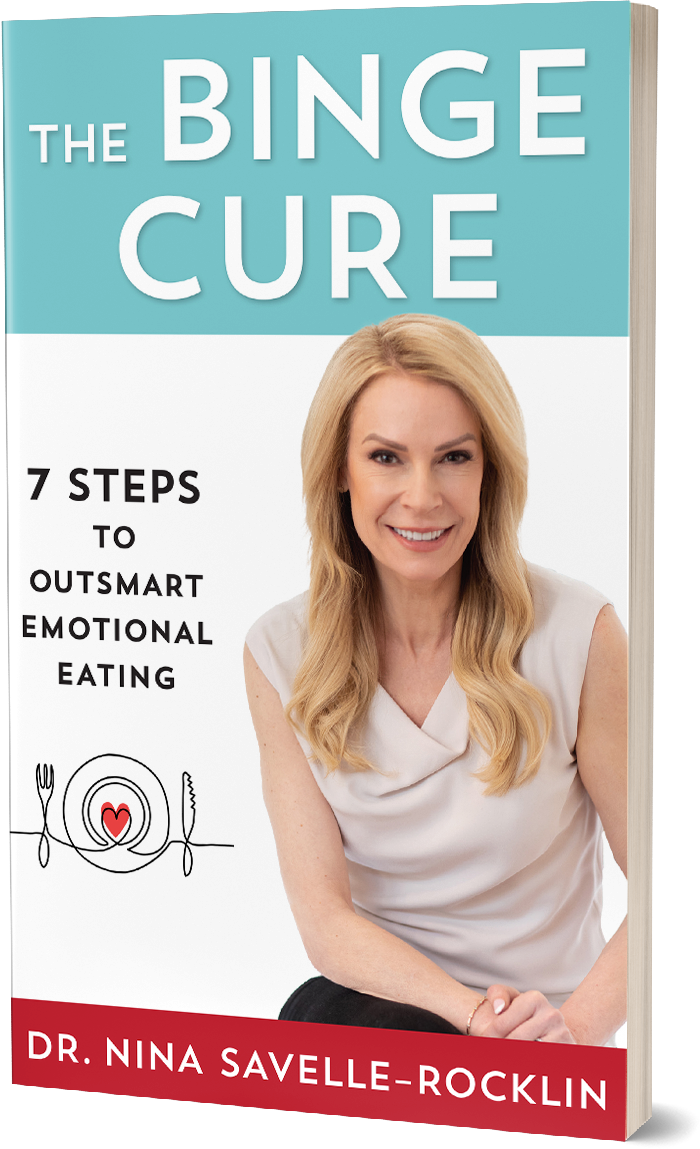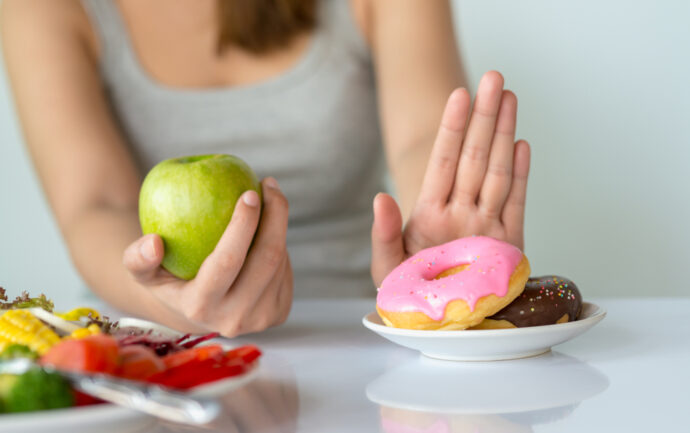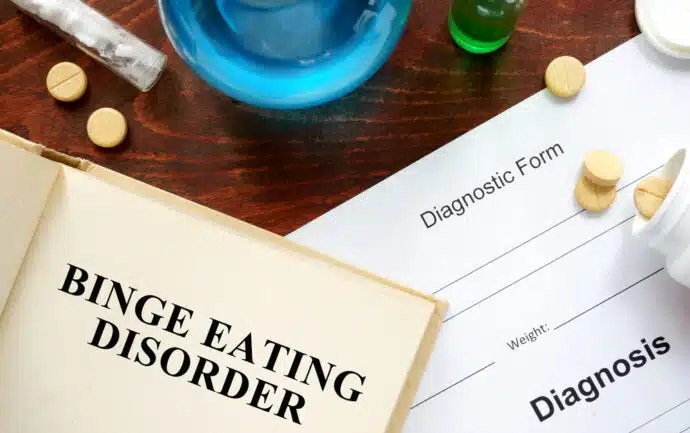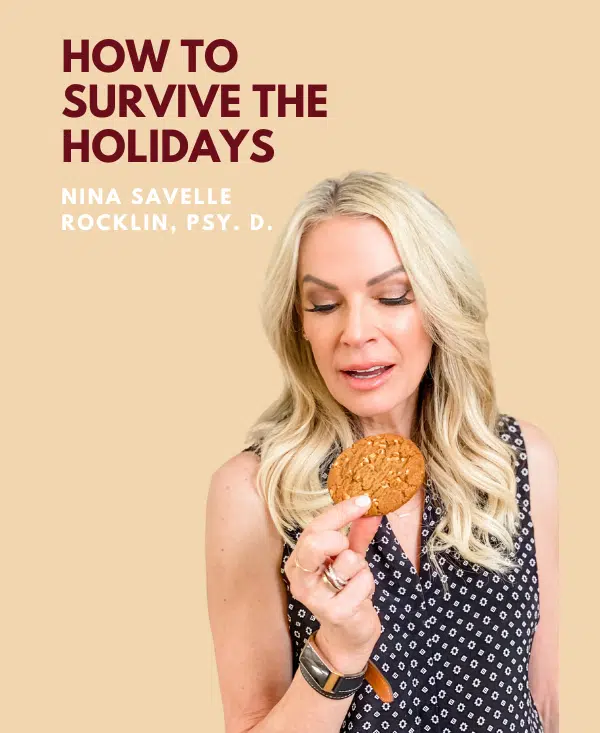Dr. Nina Savelle-Rocklin
How to Develop Resilience Against Diet Culture
Table of Contents
- Foods are neither good nor bad
- Thinner is not healthier
- The impact on relationships
- How to deal with dieters
- Maryam’s story
- Here are some additional tips to help you protect yourself from diet culture:
“Never trust a four-letter word when the first three letters spell DIE.”

That’s how documentary filmmaker Taryn Brumfitt refers to the concept of dieting in her 2016 documentary, Embrace. The film explores the unrealistic beauty standards that are promoted by the media and the diet and beauty industries.
Not much has changed in the seven years since the documentary was released. Diet culture is more pervasive than ever, and it can be damaging to our emotional health.
Diet culture bombards us with the mistaken belief that thinness equals health. From glossy magazines to social media, movies, and television, it’s hard not to be impacted by damaging messages about how we should look or what we should eat.
This culture includes the diet industry, which includes weight loss products, diets, and weight loss surgery, and the “wellness” industry, which in some cases perpetuates harmful myths about food and weight.
Internalizing these messages makes us feel as though we are never thin enough, or that our worth is directly tied to our weight. This can lead to a cycle of dieting, bingeing, and feeling guilty about food choices, which can have serious negative impacts on both physical and mental health.
Yet, it’s possible to develop resilience against diet culture, with the following strategies…
Foods are neither good nor bad
Food is often labeled as “good” or “bad” in diet culture, with the message that certain foods are healthy and others are unhealthy. This categorization can lead to feelings of guilt and shame when we eat so-called “bad” foods and can create a negative relationship with food. One problem with labeling foods as “good” or “bad” is that it can lead to bingeing.
Deprivation of certain foods only makes us want what we think we can’t have. Putting food on the “bad” list means setting ourselves up for bingeing. Eventually, our willpower fails and we eat everything on that “bad” list. Many people think, “I blew the whole day by eating those cookies, so I might as well have everything else in the kitchen.”
Essentially, deprivation leads to bingeing. This can lead to feelings of guilt and shame, which are temporarily resolved by bingeing, and the cycle continues.
Resist messages about “good” and “bad” foods by adopting a non-diet approach to food. That means eliminating the deprivation mindset, learning to trust your body, and focusing on self-care, self-love, and self-acceptance. Taking a non-diet approach to health involves focusing on your overall well-being, rather than just on your weight, and recognizing that health and well-being are more than just the number on the scale.
Thinner is not healthier
Diet culture promotes the idea that thinner is preferable and asserts that people are healthier at a lower weight. Yet this emphasis on thinness as a measure of health is not supported by scientific evidence. People come in all shapes and sizes and can still be healthy at various weight ranges.
Seeing weight as the sole indicator of health ignores the fact that health is a complex interplay of factors, including genetics, lifestyle, and overall well-being. Focusing solely on weight ignores the importance of all these facts. When we become obsessed with our weight, we may develop unhealthy eating habits which actually undermine both our physical and emotional health.
Diet culture promotes the idea that there is a quick fix when it comes to losing weight when in reality, sustainable weight loss and improved health are more complex. Dieting sets people up for disappointment and can lead to feelings of failure and hopelessness. When we repeatedly try and fail to meet our unrealistic weight loss goals, we may feel that we are not good enough and feel hopeless about ever achieving the “perfect” body promoted in the media.
Internalizing the message that being thin is the ultimate goal, means becoming hyper-focused on our bodies and constantly judging ourselves and others) based on appearance. This leads to feelings of shame, inadequacy, and low self-esteem, which can spiral into binge eating as a way of coping.
The impact on relationships
Diet culture can have a toxic impact on both our relationship with ourselves and with others. When we constantly judge ourselves and others based on appearance, it creates negative self-esteem. This can lead to feelings of isolation and disconnection, as well as a general sense of dissatisfaction with life.
People caught up in diet culture may find that it’s difficult to enjoy social events or engage in activities they want to do, as they are consumed by thoughts of food and their bodies. Instead of thinking about how much of a good time they’re having, they’re worrying about what others might be thinking of their appearance.
They may also be hard on themselves, constantly monitoring their food intake, and their bodies, and attacking themselves for not being good enough or having enough willpower. This harsh attitude toward the self creates feelings of inadequacy, shame, guilt, and self-hatred, and can lead to bingeing as a way of self-soothing.
Instead, it’s important to cultivate a kinder attitude toward yourself. If you’re turning “to” food, you’re likely turning “away” from something else. Be curious about why you’re eating instead of focusing on what you’re eating.
How to deal with dieters
If you have people in your life who are stuck in diet culture, they may stay stuck in their mindset and make comments about your food choices, and their own. If this is a concern, here are some strategies to deal with people in those situations:
Prepare clever responses:
Benjamin Franklin once said, “By failing to prepare, you are preparing to fail.” If we take that notion and reverse it, you will succeed by preparing.
Unfortunately, people who are stuck in diet culture or who don’t understand that binge eating is not about food, often make thoughtless comments. Having responses at the ready will help get you through these situations.
When people talk about their diets and food choices, here are some responses:
I understand this is important to you, but I’d prefer not to discuss weight.
You may not agree, but I’m confident in the choices I make for myself and my body.
Talking about food and diets is triggering for me. Let’s talk about something else.
There are a lot of dieters who focus not only on their own food choices and dieting goals but on everyone else’s as well. They can try to manage your food choices, which can be annoying and shaming. They often say things like:
Do you really need to eat that?
I haven’t eaten cake in five years. I feel amazing.
If that makes you cringe, here are some strategies to deal with those types of comments.
Set limits:
I’m not discussing what I’m eating or how much I weigh. That topic is off-limits.
I don’t like speaking about my weight, so I prefer you don’t bring it up.
If they say anything about food, you can say:
I like to live in a world with cake in it.
Use Humor:
If they say anything about your weight, you say:
You know what? My weight is a number and it’s unlisted.
Curvy is the new black, didn’t you hear?
Wow, I actually HAVE gained weight. Thank you for letting me know because otherwise, it would have completely escaped my attention.
Deflect:
When they say, “Do you really need to eat that?” something about your weight, you completely change the subject.
What’s new with you?
So anyway, how are you these days?
My weight really isn’t that interesting to me. What’s going on with you?
If they tell you that they are only asking because they are worried about your health, say:
I appreciate your concern, but I do not want to discuss this.
Maryam’s story
Maryam’s father was always commenting on what she was eating and how much. They always had dinner together on Sunday nights and she would dread his comments and the looks he gave her.
Each night he served her a very small portion of pasta, the portion size a child would eat. Maryam was also hungry and she ate the whole bowl, feeling awkward the whole time.
Seeing that she was finished, her father said, “Do you want more?”
“Yes, thanks,” said Maryam.
Her father said, “You have quite an appetite, don’t you? You can really put it away.”
This was a familiar dynamic with Maryam, as the same scenario played out nearly every Sunday.
In the past, she said, “Dad, you barely gave me anything for dinner. Of course, I’m still hungry.”
Her father would say, “If that’s the way you want to see it.”
Once she told him, “No thanks, Dad, I’m good.”
He said, “Sticking to that diet, are you? Good luck with that.”
This time, when she asked for more, he again commented on her large appetite. Instead of defending, justifying, or explaining herself, she appealed to his ego. “Dad, you make such good pasta, I just can’t resist.”
He stopped commenting on her level of consumption and instead agreed. “I make pretty good rigatoni if I do say so myself.”
And that was the end of that. The moral is:
If all else fails, appeal to the other person’s ego.
Whatever way you handle it, do not defend, justify or explain yourself when it comes to food. Set limits, use humor, and deflect.
Here are some additional tips to help you protect yourself from diet culture:
Practice mindful media consumption
One of the primary ways that diet culture infiltrates our lives is through the media. From magazines and TV shows to social media, we are bombarded with images and messages that promote the idea that being thin is the key to happiness, success, and beauty.
To counteract this harmful messaging, it is important to be mindful of the media we consume and to limit exposure to content that reinforces negative body image. One way to do this is to only allow media that promotes body positivity and self-acceptance.
Look for websites, podcasts, and social media accounts that celebrate diversity and promote a healthy relationship with food and our bodies. Surrounding ourselves with positive and supportive messages can help to counteract the harmful influence of diet culture and build our resilience to negative body image.
Try unfollowing or muting accounts that promote unrealistic beauty standards or diets. Social media can be a major source of diet culture, so it’s important to curate your feed to include body-positive and health-focused accounts.
Surround Yourself with the Right People
The people we surround ourselves with can have a big impact on our emotional well-being. When we’re around others who have a positive body image and are cultivating a healthy relationship with food, it’s easier for us to stay focused on our own journey. On the other hand, being around people who talk about diets or are preoccupied with their weight can make us feel bad.
So, to protect yourself from the toxic influence of diet culture, surround yourself with people who support and encourage you. Choose to spend time with friends, family members, or even online communities that celebrate self-acceptance and promote healthy attitudes. You’ll feel better and have more fun.
Learn the truth about dieting
Diet culture and disordered eating have become increasingly prevalent in our society, and it’s important to understand the dangers they pose. The $60 billion diet industry sells the false idea that weight and body size are primarily determined by individual effort and willpower. This leads to the belief that anyone can be thin if they just try hard enough.
Yet, the science behind weight and body size is much more complex. A multitude of factors influences weight and body size, including genetics, hormones, stress levels, and overall health. Our bodies have an innate ability to regulate weight and body size, and trying to manipulate this regulation can have negative effects on our health.
In fact, research has shown that dieting and restrictive eating can actually lead to weight gain over time.
Here are some reasons why dieting leads to weight gain in the long run:
- Slow Metabolism: Diets often involve reducing caloric intake, which can lead to a slower metabolism. The body perceives the reduction in food as a threat to survival and adjusts by conserving energy and slowing down metabolic processes, making it harder to lose weight in the long run.
- Hormonal Imbalances: Dieting can disrupt the balance of hormones that regulate hunger, fullness, and metabolism, leading to increased hunger and decreased feelings of fullness, making it more difficult to maintain a healthy weight.
- Yo-Yo Effect: The rapid weight loss and gain that often occur with dieting can result in a yo-yo effect, where weight is lost and regained repeatedly. This can make it harder to lose weight and keep it off in the long run.
- Restrictive Eating: Diets that restrict certain foods or food groups can lead to feelings of deprivation and a preoccupation with food. This can lead to binge eating and an unhealthy relationship with food, making it harder to maintain a healthy weight in the long run.
- Increased Stress: Dieting can be stressful, and stress has been linked to weight gain. The stress hormone cortisol can increase fat storage, particularly in the abdominal area, making it harder to lose weight.
- Decreased Muscle Mass: Diets that restrict calories or certain food groups can lead to a loss of muscle mass, which can lower metabolism and make it harder to lose weight in the long run.
Dieting can lead to weight gain in the long run because diets disrupt the balance of hormones and metabolism, increase stress, reduce muscle mass, and can lead to disordered eating, including binge eating.
By promoting unrealistic beauty standards, reinforcing disordered eating patterns, and promoting a narrow view of health, diet culture creates self-criticism, body dissatisfaction, and feelings of inadequacy. If we want to improve our overall well-being, let’s join forces to reject diet culture and embrace a more balanced approach to health and happiness.
Stepping away from diet culture takes time and patience, but with the right tools and support, you can break free from its harmful influence and learn to love and accept yourself just as you are.
Ready to transform your relationship with food?
Join Dr. Nina's newsletter and receive:
• Expert tips on overcoming emotional eating
• Strategies for sustainable weight loss
• Exclusive content not found anywhere else
Don't miss out on the latest breakthroughs in binge eating!
The Author

Dr. Nina Savelle-Rocklin is a renowned author and podcast host and one of the nation’s leading psychoanalysts known for the psychology of eating. Her signature message of, “It’s not what you’re eating, it’s what’s eating ‘at’ you” has resonated with hundreds of thousands of listeners from around the globe in 40 countries. As founder of The Binge Cure Method, she guides emotional eaters to create lasting food freedom so they can take back control of their lives and feel good in their bodies.
Related Blogs
















